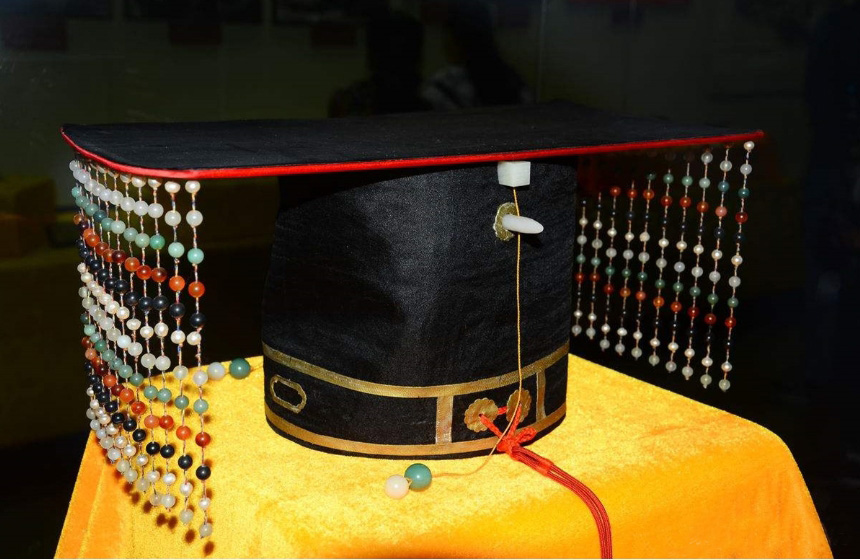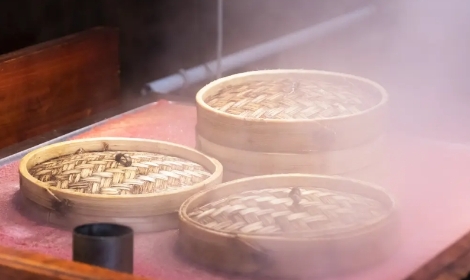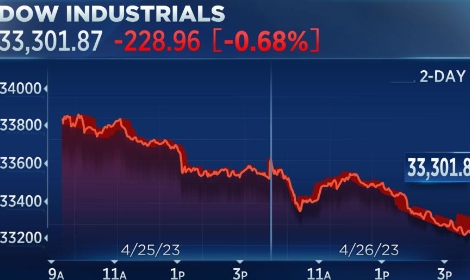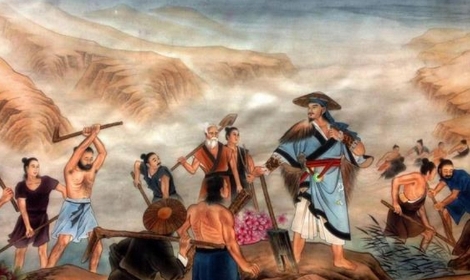QA问答:古代中国人对于帝国及其统治者有何看法?他们是否将帝国视为高于自身的某种信仰,还是将其视为生活的一部分?
正文翻译
@Aya Shawn
Looking back at the history of China to 4,000 years ago, ancient Chinese history books recorded the birth of the first dynasty:
A man named Dayu led the young men of the tribe to dig ditches to guide the floods. Saved the entire area. He was elected as the leader and managed the entire region.
When he died, his rights were seized by his son, who established the first dynasty in Chinese history: the xia Dynasty.

回溯中国历史,到4000年前,中国古史书上就有第一个王朝的诞生记载:
一个叫大禹的人带领部落的年轻人挖沟引水,拯救了整个地区。他被选为领袖,管理整个地区。
他死后,其权利被其儿子继承,建立了中国历史上第一个朝代:夏朝。
From the establishment of the xia Dynasty, the legitimacy of the ruler in the Chinese consciousness was established: if he can lead everyone to jointly fight against threats (natural threats and enemy threats), he becomes qualified as a ruler.
The Chinese abstract this legalization into a concept: The Mandate of Heaven
Meaning: God appointed him to lead this country to prosperity.
Therefore, in the eyes of the ancient Chinese, the rulers of the empire were noble, mysterious and worthy of respect. They are usually correct and will lead everyone to fight against threats and give everyone a stable life.
从夏朝建立开始,统治者的合法性在中国人意识中就已经确立:如果他能带领大家共同对抗威胁(自然的威胁和敌人的威胁),他就是一个合格的统治者。
中国人把这种合法化抽象为一个概念:天命
意思是:上天任命他带领这个国家走向繁荣。
因此在古中国人的眼中,帝国的统治者是高贵的、神秘的、值得尊敬的,他们通常都是正确的,会带领大家对抗威胁,给大家一个安定的生活。
In fact, every ancient Chinese empire did this. The existence of the ancient Chinese empire had several key missions:
1. Food
The empire needs to solve the problem of food for everyone. When this problem cannot be solved, it usually means the collapse of the empire. People think that the empire has lost "The Mandate of Heaven".
2. Law and security
The empire needs to maintain social stability and fight crime. When many criminal gangs appear in the Empire and cannot be controlled, it usually means the collapse of the Empire, and it is believed that the Empire has lost "The Mandate of Heaven".
3. Fight against disasters
Cold, drought, flood; causing huge losses. These are all problems that need to be solved by the empire. They must continue to build water conservancy projects, maintain levees on rivers, and maintain canals and reservoirs. If an empire loses its ability to withstand natural disasters, it usually means the collapse of the empire, and it is believed that the empire has lost "The Mandate of Heaven".
4. Fight against the enemy
Most of the time, it refers to the enemy in the north. Nomads are always trying to invade and plunder. The empire must maintain a strong military to solve problems. The Great Wall is the greatest remaining evidence of this work. If an empire loses its ability to fight its enemies, it usually means the empire's collapse, and it is believed that the empire has lost "The Mandate of Heaven".
其实,每一个中国古代帝国都是这么做的。中国古代帝国的存在,有几个关键的使命:
1. 食物
帝国需要解决所有人的吃饭问题。当这个问题无法解决时,通常意味着帝国的崩溃。人们认为帝国已经失去了“天命”。
2. 法律和安全
帝国需要维持社会稳定,打击犯罪。当帝国出现许多犯罪团伙,无法控制时,通常意味着帝国的崩溃,人们认为帝国已经失去了“天命”。
3. 抗击灾害
寒冷、干旱、洪水,造成巨大损失。这些都是帝国需要解决的问题。他们必须持续修建水利工程,维护河流上的堤坝,维护运河和水库。如果一个帝国失去了抵御自然灾害的能力,这通常意味着帝国的崩溃,人们认为帝国已经失去了“天命”。
4. 与敌人作战
大部分时候,它指的是北方的敌人。游牧民族总是试图入侵和掠夺。帝国必须保持强大的军事力量来解决问题。长城是这项工作留下的最大证据。如果一个帝国失去了与敌人作战的能力,这通常意味着帝国的崩溃,人们认为帝国已经失去了“天命”。
Once an empire fails to complete two, two or three of the above four tasks, the Chinese people lose trust in the empire, and resistance and revolution often follow. There have been 11 powerful empires and dozens of relatively small dynasties in Chinese history. Their collapse and demise were basically due to problems with the above four tasks.
Therefore, for the ancient Chinese, empire was an important part of their lives. If the empire is running well, everyone supports him. If there was a problem with its operation, they would overthrow it and replace it with a new one. Their only criterion for looking at empires and rulers is how well they run, not based on any "belief".
一个帝国一旦不能完成上述四项任务中的两到三项,中国人民就会对帝国失去信任,反抗和革命往往随之而来。中国历史上出现过十一个强大的帝国和几十个相对较小的王朝,它们的覆灭,基本上都是因为上述四项任务出了问题。
因此,对古代中国人来说,国家是他们生活中很重要的一部分。如果国家运转得好,每个人都会拥护他。如果国家运转得有问题,他们就会推翻它,换一个新的。他们看待帝国和统治者的唯一标准就是他们运转得好不好,而不是基于什么“信仰”。
Looking back at the history of China to 4,000 years ago, ancient Chinese history books recorded the birth of the first dynasty:
A man named Dayu led the young men of the tribe to dig ditches to guide the floods. Saved the entire area. He was elected as the leader and managed the entire region.
When he died, his rights were seized by his son, who established the first dynasty in Chinese history: the xia Dynasty.

回溯中国历史,到4000年前,中国古史书上就有第一个王朝的诞生记载:
一个叫大禹的人带领部落的年轻人挖沟引水,拯救了整个地区。他被选为领袖,管理整个地区。
他死后,其权利被其儿子继承,建立了中国历史上第一个朝代:夏朝。
From the establishment of the xia Dynasty, the legitimacy of the ruler in the Chinese consciousness was established: if he can lead everyone to jointly fight against threats (natural threats and enemy threats), he becomes qualified as a ruler.
The Chinese abstract this legalization into a concept: The Mandate of Heaven
Meaning: God appointed him to lead this country to prosperity.
Therefore, in the eyes of the ancient Chinese, the rulers of the empire were noble, mysterious and worthy of respect. They are usually correct and will lead everyone to fight against threats and give everyone a stable life.
从夏朝建立开始,统治者的合法性在中国人意识中就已经确立:如果他能带领大家共同对抗威胁(自然的威胁和敌人的威胁),他就是一个合格的统治者。
中国人把这种合法化抽象为一个概念:天命
意思是:上天任命他带领这个国家走向繁荣。
因此在古中国人的眼中,帝国的统治者是高贵的、神秘的、值得尊敬的,他们通常都是正确的,会带领大家对抗威胁,给大家一个安定的生活。
In fact, every ancient Chinese empire did this. The existence of the ancient Chinese empire had several key missions:
1. Food
The empire needs to solve the problem of food for everyone. When this problem cannot be solved, it usually means the collapse of the empire. People think that the empire has lost "The Mandate of Heaven".
2. Law and security
The empire needs to maintain social stability and fight crime. When many criminal gangs appear in the Empire and cannot be controlled, it usually means the collapse of the Empire, and it is believed that the Empire has lost "The Mandate of Heaven".
3. Fight against disasters
Cold, drought, flood; causing huge losses. These are all problems that need to be solved by the empire. They must continue to build water conservancy projects, maintain levees on rivers, and maintain canals and reservoirs. If an empire loses its ability to withstand natural disasters, it usually means the collapse of the empire, and it is believed that the empire has lost "The Mandate of Heaven".
4. Fight against the enemy
Most of the time, it refers to the enemy in the north. Nomads are always trying to invade and plunder. The empire must maintain a strong military to solve problems. The Great Wall is the greatest remaining evidence of this work. If an empire loses its ability to fight its enemies, it usually means the empire's collapse, and it is believed that the empire has lost "The Mandate of Heaven".
其实,每一个中国古代帝国都是这么做的。中国古代帝国的存在,有几个关键的使命:
1. 食物
帝国需要解决所有人的吃饭问题。当这个问题无法解决时,通常意味着帝国的崩溃。人们认为帝国已经失去了“天命”。
2. 法律和安全
帝国需要维持社会稳定,打击犯罪。当帝国出现许多犯罪团伙,无法控制时,通常意味着帝国的崩溃,人们认为帝国已经失去了“天命”。
3. 抗击灾害
寒冷、干旱、洪水,造成巨大损失。这些都是帝国需要解决的问题。他们必须持续修建水利工程,维护河流上的堤坝,维护运河和水库。如果一个帝国失去了抵御自然灾害的能力,这通常意味着帝国的崩溃,人们认为帝国已经失去了“天命”。
4. 与敌人作战
大部分时候,它指的是北方的敌人。游牧民族总是试图入侵和掠夺。帝国必须保持强大的军事力量来解决问题。长城是这项工作留下的最大证据。如果一个帝国失去了与敌人作战的能力,这通常意味着帝国的崩溃,人们认为帝国已经失去了“天命”。
Once an empire fails to complete two, two or three of the above four tasks, the Chinese people lose trust in the empire, and resistance and revolution often follow. There have been 11 powerful empires and dozens of relatively small dynasties in Chinese history. Their collapse and demise were basically due to problems with the above four tasks.
Therefore, for the ancient Chinese, empire was an important part of their lives. If the empire is running well, everyone supports him. If there was a problem with its operation, they would overthrow it and replace it with a new one. Their only criterion for looking at empires and rulers is how well they run, not based on any "belief".
一个帝国一旦不能完成上述四项任务中的两到三项,中国人民就会对帝国失去信任,反抗和革命往往随之而来。中国历史上出现过十一个强大的帝国和几十个相对较小的王朝,它们的覆灭,基本上都是因为上述四项任务出了问题。
因此,对古代中国人来说,国家是他们生活中很重要的一部分。如果国家运转得好,每个人都会拥护他。如果国家运转得有问题,他们就会推翻它,换一个新的。他们看待帝国和统治者的唯一标准就是他们运转得好不好,而不是基于什么“信仰”。
评论翻译
@Frank Shih
I've tried to explain the concept to my expats colleagues in a simple term - it's a contract, we give you the power, you do your job to look after us. If you failed, you can't do the sh*t, then it's my turn. CPC or emperor or whatever, all same. The change cost is high, usually one hundred years of disastrous life, but after new CEO appointed by “us”, he rules. Then new cycle begins.
我曾尝试用简单的术语向我的外籍同事解释这个概念——这是一份合同,我们给你权力,你做你的工作来照顾我们。如果你失败了,你做不了,就轮到我了。不管是**党还是皇帝,都一样。变革的成本很高,通常是一百年的灾难性生活,但在“我们”任命新的首席执行官后,他就会统治。然后新的周期开始。
@Adesina
Morons pretending to be educated democrats can't understand!
US history is one of aggressive individuality. Each pioneer that landed in the new world equip himself with guns and supplies then move off into the wild to make his way.
This has engraved the love of individuality above collectivism in latter day Americans.
China is the opposite, the well being of Chinese is closely correlated with a strong central authority working for the good of all.
Now the west led by US is trying to get China to abandon its root and adopt Western fierce individuality.
If Chinese fall into that trap another century of humiliation is guaranteed.
那些假装受过教育的民主人士的白痴根本无法理解!
美国历史是一部充满个性和进取精神的历史,每个踏上新大陆的拓荒者都带着枪和物资,在荒野中开拓自己的道路。
这在后来的美国人心中根深蒂固地认为,个体高于集体主义。
中国则相反,中国人的福祉与一个为所有人谋福利的强大的中央权力密切相关。
如今以美国为首的西方正试图让中国抛弃自己的根源,接受西方激烈的个体化思想。
如果中国落入这个陷阱,注定会再遭受百年屈辱。
@ZhiG Chen
Looking at the Chinese communist Party’s disaster relief capabilities, food and resource reserves, and strategic mobilization capabilities, the communist Party will definitely not give up its fundamentals of “serving the people.”
以中g的救灾能力、粮食资源储备能力、战略动员能力来看,党是绝不会放弃“为人民服务”的根本的。
@La De Da
“Meaning: God appointed him to lead this country to prosperity.”
Ancient China wasn't monotheistic. It would be less God and more like the universe.
“意思是:上天任命他带领这个国家走向繁荣。”
古代中国不是一神教。它与神的关系较少,而与宇宙关系较多。
@Shu Liu
For a very long time, most Chinese people are always lack of food. I think that’s partly the reason why there is so many different types and stylish food in China, we need to find ways to preserve food.
很长一段时间以来,大多数中国人都处于粮食短缺的状态。我认为这也是为什么中国有这么多种类和风格的美食的原因之一,我们需要找到保存食物的方法。
@Patrick Lee
Thanks, Aya Shawn! Good explanation on Chinese people belief in the Mandate of the Heaven!
谢谢,Aya Shawn !很好地解释了中国人对天命的信仰!
@Mark Houston
Before seeing this answer, I always thought that China's "Mandate of the Heaven" was some kind of mysticism
It seems that it is just real politics wrapped in a mysterious cloak
在看到这个答案之前,我一直以为中国的“天命”是某种神秘主义
看来,它只是现实政治被包裹上了神秘的外衣
@Ayami Asakura
The concept of mandate of heaven isn't myth
The start of the mandate of heaven started with zhou was just passed down.
It's basically the right to rebellion in modern times.
天命的概念并非神话
天命始于周,传承于今。
这基本上就是现代的“反抗的权利”。
@Patrick Lee
What do you know about Mandate of the Heaven? Care to share?
你对天命了解多少?愿意分享吗?
@Ahsun Hon
Agree. Just like that carpenter in Middle East who died and then rose again, and that man who ate the apple instead of the snake. All are myths.
同意。就像中东那个死而复生的木匠,还有那个吃苹果而不吃蛇的人。都是神话。
@Abeeha
In ancient China, the beliefs regarding the empire and its ruler were rooted in Confucianism. According to Confucian teachings, the empire was seen as a natural part of life, and the ruler held a position of great importance and responsibility. The empire was considered superior, but not in a way that diminished the value of the individuals within it. Instead, it emphasized the harmony and order that the empire provided for its people. The ruler was expected to govern with benevolence and virtue, ensuring the well-being of the people. So, it was a combination of viewing the empire as superior while also recognizing the interconnectedness between the ruler and the people.
在古代中国,关于帝国及其统治者的信仰植根于儒家思想。 根据儒家教义,帝国被视为生活的自然组成部分,统治者占据着重要地位和责任。 帝国被认为是更高层面的,但并没有降低帝国内部个人的价值。 相反,它强调帝国为其人民提供的和谐与秩序。 统治者应当以仁德施政,确保人民的福祉。 因此,这是一种将帝国视为更高层面的同时也认识到统治者与人民之间相互联系的结合。
@Patrick S
Ancient Chinese beliefs regarding the empire and its ruler were deeply intertwined with their understanding of the natural order of the world. The concept of the Mandate of Heaven played a crucial role in shaping these beliefs, asserting that the ruler was chosen by the divine forces to govern the empire. This belief system positioned the empire and its ruler as integral parts of a harmonious cosmic order.
In ancient China, the emperor was seen as the Son of Heaven, the intermediary between the earthly realm and the divine realm. As such, the ruler was expected to embody virtues such as benevolence, righteousness, and wisdom in order to maintain the balance between heaven and earth. The emperor’s legitimacy to rule was derived from his ability to uphold this moral code and govern with the welfare of the people in mind.
While the emperor held a position of supreme authority within the empire, the ancient Chinese did not necessarily view the empire as superior to themselves in a hierarchical sense. Instead, they saw the emperor as a fatherly figure, responsible for guiding and protecting his subjects. The emperor’s power was believed to be granted by heaven, but it was also contingent upon his ability to govern justly and effectively.As the OP said, once the emperor becomes incompetent, its legitimacy comes into question
The ancient Chinese viewed the empire as a natural part of life, reflecting the cyclical nature of existence and the interconnectedness of all things. The emperor’s role was to maintain harmony and order within the empire, ensuring that the cosmic balance was preserved. In this way, the empire was seen as a reflection of the larger cosmic order, with the ruler serving as a steward of this balance.
However, it is important to note that not all emperors lived up to the ideals of the Mandate of Heaven. Throughout Chinese history, there were instances of corrupt or tyrannical rulers who abused their power and brought suffering to the people. In these cases, popular uprisings or dynastic changes often occurred as a means of restoring balance and legitimacy to the empire.
Overall, ancient Chinese beliefs regarding the empire and its ruler were complex and multifaceted, shaped by a deep reverence for the natural order of the world and the role of the divine in human affairs. The emperor was both a symbol of authority and a custodian of cosmic harmony, tasked with upholding virtue and righteousness in governance. This worldview reflected the interconnectedness of humanity, nature, and the divine, emphasizing the importance of maintaining balance and harmony in all aspects of life.
古代中国关于帝国及其统治者的信仰与他们对世界自然秩序的理解深深地交织在一起。 天命的概念在塑造这些信仰方面发挥了至关重要的作用,它声称统治者是由神圣力量选择来统治帝国的。 这种信仰体系将帝国及其统治者定位为和谐宇宙秩序的组成部分。
在古代中国,皇帝被视为天子,是尘世与神界之间的中介。 因此,统治者需要体现仁、义、智等美德,以维持天地之间的平衡。 皇帝的统治合法性来自于他能够坚守这一道德准则并以人民的福祉为重。
虽然皇帝在帝国内拥有至高无上的权力,但古代中国人并不一定认为帝国在等级意义上高于自己。 相反,他们将皇帝视为父亲般的人物,负责指导和保护他的臣民。 皇帝的权力被认为是上天赐予的,但这也取决于他公正和有效统治的能力。正如答主所说,一旦皇帝变得无能,它的合法性就会受到质疑
古代中国人将帝国视为生命的自然组成部分,反映了存在的循环性和万物的相互联系。 皇帝的职责是维持帝国内部的和谐与秩序,确保宇宙的平衡得以维持。 通过这种方式,帝国被视为更大的宇宙秩序的反映,而统治者则是这种平衡的管理者。
然而,值得注意的是,并非所有皇帝都实现了天命的理想。 纵观中国历史,不乏腐败残暴的统治者滥用职权,给人民带来苦难的事例。 在这些情况下,民众起义或王朝更迭常常作为恢复帝国平衡和合法性的手段而发生。
总体而言,古代中国关于帝国及其统治者的信仰是复杂而多方面的,是由对世界自然秩序和神在人类事务中的作用的深深尊重而形成的。 皇帝既是权力的象征,又是宇宙和谐的守护者,肩负着在治理中维护德性和正义的使命。 这种世界观反映了人性、自然和神性的相互联系,强调在生活的各个方面保持平衡与和谐的重要性。
I've tried to explain the concept to my expats colleagues in a simple term - it's a contract, we give you the power, you do your job to look after us. If you failed, you can't do the sh*t, then it's my turn. CPC or emperor or whatever, all same. The change cost is high, usually one hundred years of disastrous life, but after new CEO appointed by “us”, he rules. Then new cycle begins.
我曾尝试用简单的术语向我的外籍同事解释这个概念——这是一份合同,我们给你权力,你做你的工作来照顾我们。如果你失败了,你做不了,就轮到我了。不管是**党还是皇帝,都一样。变革的成本很高,通常是一百年的灾难性生活,但在“我们”任命新的首席执行官后,他就会统治。然后新的周期开始。
@Adesina
Morons pretending to be educated democrats can't understand!
US history is one of aggressive individuality. Each pioneer that landed in the new world equip himself with guns and supplies then move off into the wild to make his way.
This has engraved the love of individuality above collectivism in latter day Americans.
China is the opposite, the well being of Chinese is closely correlated with a strong central authority working for the good of all.
Now the west led by US is trying to get China to abandon its root and adopt Western fierce individuality.
If Chinese fall into that trap another century of humiliation is guaranteed.
那些假装受过教育的民主人士的白痴根本无法理解!
美国历史是一部充满个性和进取精神的历史,每个踏上新大陆的拓荒者都带着枪和物资,在荒野中开拓自己的道路。
这在后来的美国人心中根深蒂固地认为,个体高于集体主义。
中国则相反,中国人的福祉与一个为所有人谋福利的强大的中央权力密切相关。
如今以美国为首的西方正试图让中国抛弃自己的根源,接受西方激烈的个体化思想。
如果中国落入这个陷阱,注定会再遭受百年屈辱。
@ZhiG Chen
Looking at the Chinese communist Party’s disaster relief capabilities, food and resource reserves, and strategic mobilization capabilities, the communist Party will definitely not give up its fundamentals of “serving the people.”
以中g的救灾能力、粮食资源储备能力、战略动员能力来看,党是绝不会放弃“为人民服务”的根本的。
@La De Da
“Meaning: God appointed him to lead this country to prosperity.”
Ancient China wasn't monotheistic. It would be less God and more like the universe.
“意思是:上天任命他带领这个国家走向繁荣。”
古代中国不是一神教。它与神的关系较少,而与宇宙关系较多。
@Shu Liu
For a very long time, most Chinese people are always lack of food. I think that’s partly the reason why there is so many different types and stylish food in China, we need to find ways to preserve food.
很长一段时间以来,大多数中国人都处于粮食短缺的状态。我认为这也是为什么中国有这么多种类和风格的美食的原因之一,我们需要找到保存食物的方法。
@Patrick Lee
Thanks, Aya Shawn! Good explanation on Chinese people belief in the Mandate of the Heaven!
谢谢,Aya Shawn !很好地解释了中国人对天命的信仰!
@Mark Houston
Before seeing this answer, I always thought that China's "Mandate of the Heaven" was some kind of mysticism
It seems that it is just real politics wrapped in a mysterious cloak
在看到这个答案之前,我一直以为中国的“天命”是某种神秘主义
看来,它只是现实政治被包裹上了神秘的外衣
@Ayami Asakura
The concept of mandate of heaven isn't myth
The start of the mandate of heaven started with zhou was just passed down.
It's basically the right to rebellion in modern times.
天命的概念并非神话
天命始于周,传承于今。
这基本上就是现代的“反抗的权利”。
@Patrick Lee
What do you know about Mandate of the Heaven? Care to share?
你对天命了解多少?愿意分享吗?
@Ahsun Hon
Agree. Just like that carpenter in Middle East who died and then rose again, and that man who ate the apple instead of the snake. All are myths.
同意。就像中东那个死而复生的木匠,还有那个吃苹果而不吃蛇的人。都是神话。
@Abeeha
In ancient China, the beliefs regarding the empire and its ruler were rooted in Confucianism. According to Confucian teachings, the empire was seen as a natural part of life, and the ruler held a position of great importance and responsibility. The empire was considered superior, but not in a way that diminished the value of the individuals within it. Instead, it emphasized the harmony and order that the empire provided for its people. The ruler was expected to govern with benevolence and virtue, ensuring the well-being of the people. So, it was a combination of viewing the empire as superior while also recognizing the interconnectedness between the ruler and the people.
在古代中国,关于帝国及其统治者的信仰植根于儒家思想。 根据儒家教义,帝国被视为生活的自然组成部分,统治者占据着重要地位和责任。 帝国被认为是更高层面的,但并没有降低帝国内部个人的价值。 相反,它强调帝国为其人民提供的和谐与秩序。 统治者应当以仁德施政,确保人民的福祉。 因此,这是一种将帝国视为更高层面的同时也认识到统治者与人民之间相互联系的结合。
@Patrick S
Ancient Chinese beliefs regarding the empire and its ruler were deeply intertwined with their understanding of the natural order of the world. The concept of the Mandate of Heaven played a crucial role in shaping these beliefs, asserting that the ruler was chosen by the divine forces to govern the empire. This belief system positioned the empire and its ruler as integral parts of a harmonious cosmic order.
In ancient China, the emperor was seen as the Son of Heaven, the intermediary between the earthly realm and the divine realm. As such, the ruler was expected to embody virtues such as benevolence, righteousness, and wisdom in order to maintain the balance between heaven and earth. The emperor’s legitimacy to rule was derived from his ability to uphold this moral code and govern with the welfare of the people in mind.
While the emperor held a position of supreme authority within the empire, the ancient Chinese did not necessarily view the empire as superior to themselves in a hierarchical sense. Instead, they saw the emperor as a fatherly figure, responsible for guiding and protecting his subjects. The emperor’s power was believed to be granted by heaven, but it was also contingent upon his ability to govern justly and effectively.As the OP said, once the emperor becomes incompetent, its legitimacy comes into question
The ancient Chinese viewed the empire as a natural part of life, reflecting the cyclical nature of existence and the interconnectedness of all things. The emperor’s role was to maintain harmony and order within the empire, ensuring that the cosmic balance was preserved. In this way, the empire was seen as a reflection of the larger cosmic order, with the ruler serving as a steward of this balance.
However, it is important to note that not all emperors lived up to the ideals of the Mandate of Heaven. Throughout Chinese history, there were instances of corrupt or tyrannical rulers who abused their power and brought suffering to the people. In these cases, popular uprisings or dynastic changes often occurred as a means of restoring balance and legitimacy to the empire.
Overall, ancient Chinese beliefs regarding the empire and its ruler were complex and multifaceted, shaped by a deep reverence for the natural order of the world and the role of the divine in human affairs. The emperor was both a symbol of authority and a custodian of cosmic harmony, tasked with upholding virtue and righteousness in governance. This worldview reflected the interconnectedness of humanity, nature, and the divine, emphasizing the importance of maintaining balance and harmony in all aspects of life.
古代中国关于帝国及其统治者的信仰与他们对世界自然秩序的理解深深地交织在一起。 天命的概念在塑造这些信仰方面发挥了至关重要的作用,它声称统治者是由神圣力量选择来统治帝国的。 这种信仰体系将帝国及其统治者定位为和谐宇宙秩序的组成部分。
在古代中国,皇帝被视为天子,是尘世与神界之间的中介。 因此,统治者需要体现仁、义、智等美德,以维持天地之间的平衡。 皇帝的统治合法性来自于他能够坚守这一道德准则并以人民的福祉为重。
虽然皇帝在帝国内拥有至高无上的权力,但古代中国人并不一定认为帝国在等级意义上高于自己。 相反,他们将皇帝视为父亲般的人物,负责指导和保护他的臣民。 皇帝的权力被认为是上天赐予的,但这也取决于他公正和有效统治的能力。正如答主所说,一旦皇帝变得无能,它的合法性就会受到质疑
古代中国人将帝国视为生命的自然组成部分,反映了存在的循环性和万物的相互联系。 皇帝的职责是维持帝国内部的和谐与秩序,确保宇宙的平衡得以维持。 通过这种方式,帝国被视为更大的宇宙秩序的反映,而统治者则是这种平衡的管理者。
然而,值得注意的是,并非所有皇帝都实现了天命的理想。 纵观中国历史,不乏腐败残暴的统治者滥用职权,给人民带来苦难的事例。 在这些情况下,民众起义或王朝更迭常常作为恢复帝国平衡和合法性的手段而发生。
总体而言,古代中国关于帝国及其统治者的信仰是复杂而多方面的,是由对世界自然秩序和神在人类事务中的作用的深深尊重而形成的。 皇帝既是权力的象征,又是宇宙和谐的守护者,肩负着在治理中维护德性和正义的使命。 这种世界观反映了人性、自然和神性的相互联系,强调在生活的各个方面保持平衡与和谐的重要性。








